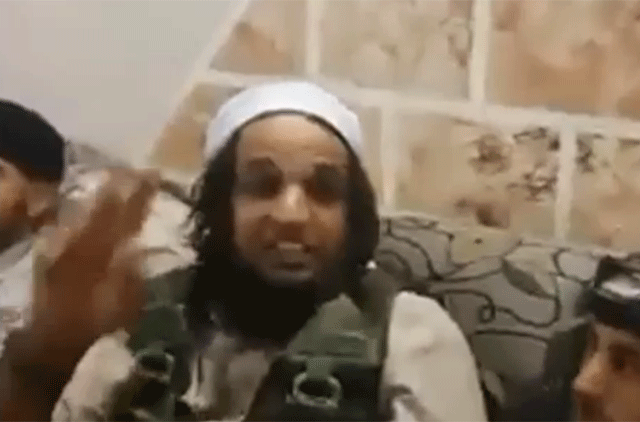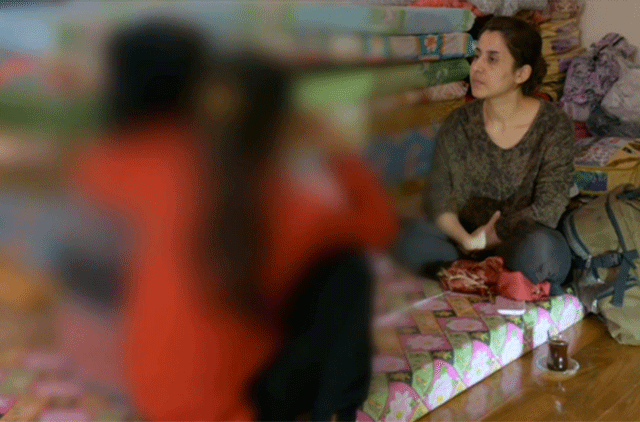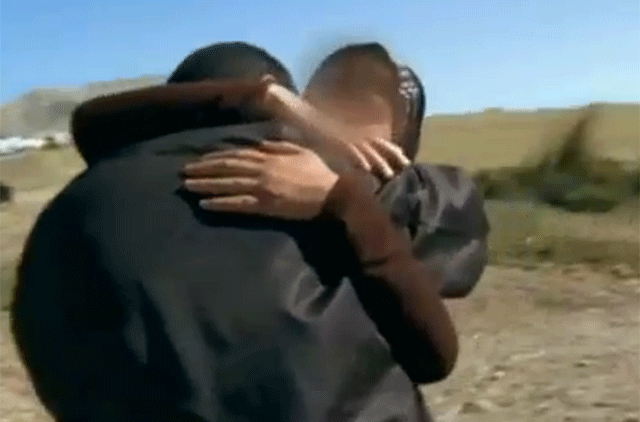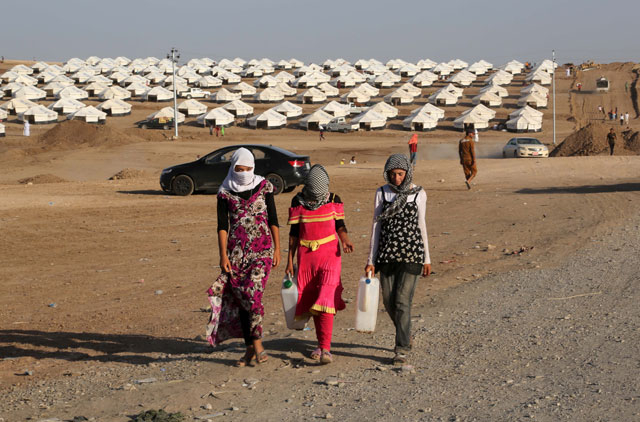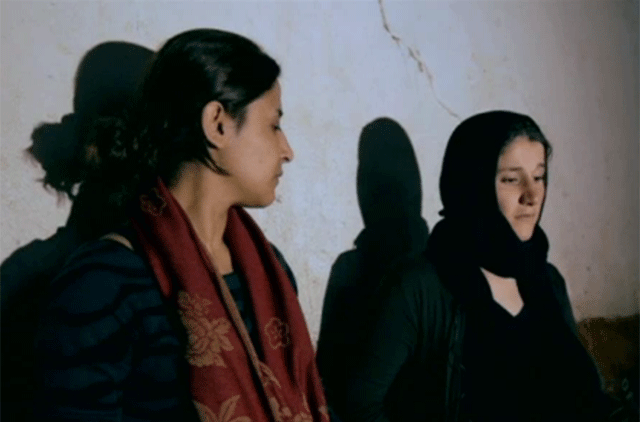
Dubai: A 13-year-old Yazidi girl was sequentially sold to three different Daesh men in northern Iraq. One of them locked her in a room and told his children that she was a Yazidi who had embraced Islam. He told them he would teach her how to pray and read the Quran. He raped her for three days.
Hamshe, a 19-year-old woman, also held captive by Daesh said the terrorists forced women to donate their blood to treat wounded fighters.
“They killed my husband, father-in-law, and brother-in-law”.
A seven-year-old boy imprisoned by Daesh has panic attacks when he sees black. Black means the colour of Daesh.
These are the stories of macabre brutality unleashed by Daesh. Although Hamshe, the 13-year-old girl and young boy managed to escape captivity, today thousands of Yazidis still endure torture, pain and violence at the hands of Daesh fighters every day of their lives.
Kurdish Yazidi activist, Nareen Shammo, has made it her vocation to ensure the freedom of Kurdish Yazidis and reunite them with their families, like the father who saw his daughter months after she was bought off Daesh forces. Dabbing tears from the bags under his eyes, he runs across the Iraqi desert. In a state of disbelief, he opens his arms ready to embrace his daughter for the first time since her ordeal. His daughter had been held by Daesh fighters as a slave.
The footage of the reunion was first aired by a Kurdish station and is seen in the closing minutes of the BBC Arabic documentary Slaves of the Caliphate.
The documentary focuses on the efforts of Shammo, who resigned from her job as a journalist when Daesh forces took control of the Iraqi city of Sinjar in August 2014. Since then, she has been part of the ‘Yazidis Across the World’ initiative and devotes her time working to free captured Yazidis.
“I began gathering the names of kidnapped women through Facebook. I appealed for help in documenting the names of kidnapped women and girls, their ages and hometowns in the Sinjar area. People got in touch with me, asking for help. At one point I was in contact with more than 300 kidnapped Yazidis. I managed to get in touch with them via their personal mobile phones, but contact with them was unstable as their phones would be often taken from them,” Shammo told Gulf News.
Since August 2014, more than 500 Yazidis have been freed from the clutches of Daesh, 300 of which were women. Today there are still more than 3,000 women, who are believed to be facing rape and torture by Daesh forces.
So far, the Kurdistan Regional Government (KRG) in the semi-autonomous north of Iraq, has spent $1.5 million (Dh5.5 million) on buying the freedom of the captives. In the BBC documentary, a Kurdish official explains that the KRG has its own scheme in retrieving the hostages. He said that the money “does not go to [Daesh] directly, rather to the negotiators”.
‘Spirits are broken’
“Although some managed to escape, most of the 500 were bought to freedom from clans that had lent their support in establishing the Islamic State,” Shammo said, referring to Daesh. “There are still over 7,000 Yazidis held captive.”
She said the ransom for the captives would range anywhere from $1,000 to $10,000, depending on age, gender and their physical appearance.
“Most of the families don’t have the means to fund their relatives’ freedom,” she said, “some NGOs lend a helping hand to secure the prisoners’ release”.
However, freeing them is only the first step.
“These victims have been subjected to psychological torment. Their spirits are broken. There are some Yazidi women who have been raped by at least 15 men. They have had their faces spat on. They have been locked up and sold to other fighters for as little as $15. Yet, there are no centres to help them rehabilitate, guide them as they try to reintegrate into society and restart their lives. Most of them still live in refugee camps.”
Shammo regularly visits those she has helped free. While speaking to Gulf News over the phone from Iraq, she said she had recently visited the seven-year-old boy who was held captive by Daesh.
“I was asked not to wear black as he instinctively seems to associate the colour with Daesh fighters. He has fits of panic and anxiety when he sees someone wearing black. His mother told me that he had witnessed them torture and murder dozens. Imagine the long-term trauma this young boy must endure until he finds some semblance to a normal life.”
Unfortunately, there are no strategic plans to free the captured Yazidis, Shammo said the fate of the imprisoned was contingent on government efforts.
“I had recently gone to Baghdad with a group of ‘Yazidi Activities’ delegates,” she said, referring to an advocacy group.
“We met Iraqi President [Fouad Masoum], Defence Minister [Sa’adoun Al Dulaimi], the French ambassador and officials from the US embassy. We desperately tried to ensure a plan was set to release the prisoners. Unfortunately, there doesn’t seem to be one. Both the [government in Baghdad] and [KRG] seem to be unaware of how to effectively approach the situation.”
Shammo said it was necessary for the freed Yazidis to leave Iraq for some time.
“It is important for them to leave Iraq, and change their setting. It is vital for their rehabilitation. They can’t even trust their neighbours anymore.”
Shammo said that the international community plays an important role in putting an end to the carnage.
Carnage must stop
“Unfortunately, it seems to me that our anguish is being treating like a passing event,” she said, “but this is a humanitarian case. We count on the international community to push nations into taking active measures to stop this carnage, to give a light and voice to our cause.”
Shammo said the stress of her work has caused her to be hospitalised a few times. “I am spiritually dead and disappointed.”
A 21-year-old Yazidi woman recounts the horrors she suffered: “There is no horror that I haven’t experienced, I lost my senses. There is nothing worse than rape, I saw everything. I saw girls being raped, I witnessed their torture. I saw babies being separated from their mothers... They killed our fathers, uncles and everyone.”
Hamshe is among the lucky few to have escaped Daesh.
“I can never forget when they separated the men and women from each other. They took the men of my family and forced them to lie face down. I then heard gunshots, I couldn’t look their way to see if they had been killed.
"It was very painful to witness women and girls being taken as war spoils. Each Daesh fighter was holding the hand of a Yazidi girl and took her for himself. It was harder than facing death... one of them took me to his house and locked me inside a room and told me I will not give you food or water if you refuse to marry me.”
She narrates the story of her escape: “One night my baby was crying from thirst. I knocked at the door but they didn’t open it for us. I broke the door and saw all the guards sleeping outside. I took a bottle of water from them and I ran away with my baby and walked for four hours”. That’s when she savoured freedom.


